Once a jolly swagman camped by a billabong,
Under the shade of a coolibah tree,
And he sang as he watched and waited 'til his billy boiled
"Who'll come a-waltzing, Matilda, with me?"
Waltzing Matilda, Waltzing Matilda
Who'll come a-waltzing, Matilda, with me
And he sang as he watched and waited 'til his billy boiled,
"Who'll come a-waltzing, Matilda, with me?"
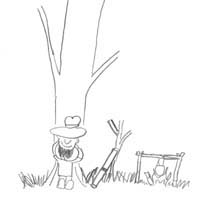
Swagman - a drifter, a hobo, an itinerant shearer who carried all his belongings wrapped up in a blanket or cloth called a swag.
Billabong - a waterhole near a river
Coolibah - a eucalyptus tree
Billy- a tin can with a wire handle used to boil water in
Along came a jumbuck to drink at the billabong,
Up jumped the swagman and grabbed him with glee,
And he sang as he stowed that jumbuck in his tucker bag,
"You'll come a-waltzing, Matilda, with me".
Waltzing Matilda, Waltzing Matilda
Who'll come a-waltzing, Matilda, with me
And he sang as he watched and waited 'til his billy boiled,
"Who'll come a-waltzing, Matilda, with me?".
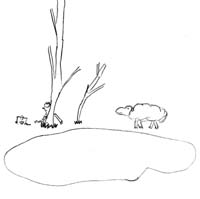
Jumbuck - a sheep
Tucker Bag - a bag for keeping food in
Up rode the squatter, mounted on his thoroughbred,
Down came the troopers, one, two, three,
"Whose is that jumbuck you've got in your tucker bag?"
"You'll come a-waltzing, Matilda, with me".
Waltzing Matilda, Waltzing Matilda
Who'll come a-waltzing, Matilda, with me
And he sang as he watched and waited 'til his billy boiled,
"Who'll come a-waltzing, Matilda, with me?".
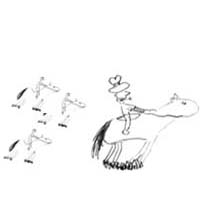
Squatter - a wealthy landowner.
Trooper - a policeman, a mounted militia-man.
Up jumped the swagman, leapt into the billabong,
"You'll never catch me alive," said he,
And his ghost may be heard as you pass by the billabong,
"Who'll come a-waltzing, Matilda, with me".
Waltzing Matilda, Waltzing Matilda
Who'll come a-waltzing, Matilda, with me
And he sang as he watched and waited 'til his billy boiled,
"Who'll come a-waltzing, Matilda, with me?"
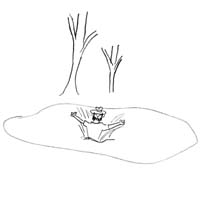
Artwork by Trishan
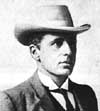 Andrew Barton (Banjo)
Andrew Barton (Banjo)